Menu


Over the past few years, there has been an accelerated interest in using mushroom meat substitutes as an alternative to animal meat or plant-based “meats.”
This enthusiasm has been spurred by a growing body of scientific research showing the many benefits of consuming mushroom meat substitutes over traditional and plant-based meat alternatives.
These benefits lie at the heart of two of the fungi’s main unique structures: mushrooms and mycelium.
At Real Mushrooms, we love mushrooms and believe they have many benefits to offer.
That’s why we’re going to explore four reasons why you should consider consuming mushrooms and fungi meat substitutes regularly.
When it comes to commercially-produced meat substitutes that are fungi-based, there are two kinds available:
Mushrooms are the fruiting bodies or the reproductive structures of a fungus. They grow after mycelium—the vegetative part of the fungus, consisting of thread-like fibers—is exposed to favorable conditions for a certain period.
You’re familiar with these as they are abundantly available at your local market. You’ll usually find white button mushrooms, at the very least. However, mushroom meat substitutes producers will often use a variety of culinary mushrooms that offer a robust flavor profile.
For instance, Mushroomeat by the brand Untamed Feast is a ground beef alternative that features 5 mushroom types: porcini, boletes, shiitake mushrooms, oyster mushrooms, and agaricus (button). This product uses dried mushrooms and other dry ingredients, so it is shelf-stable until you add liquid to it when you are ready to use it in your cooking.
Another brand Fable, uses fresh shiitake mushrooms instead of dry in their Meaty Pulled Mushrooms product. It is pre-seasoned to create a convenient prepared meat alternative, flavored with onion powder and other spices for a rich taste.
The term “mushroom meat substitutes” is a misnomer in the case of certain products, as some fungal meat alternatives are not made of mushrooms.
Instead, they are made from mycelium.
Mycelium is the vegetative part of the fungus, consisting of a network of thread-like fibers. Whenever you see a mushroom growing above ground, there is an abundance of these white fibers growing underground. You can think of it as the mushroom’s root system.
When it comes to commercial mycelium-based meat alternatives, the mycelium is:
This process was invented in the 80s and approved by the FDA in 2002, showing that mushroom meat substitutes are completely safe for consumption.
Brands like Meati and MyForest Foods use mycelium in the creation of meat substitutes that are intended to have the appearance, texture, and flavor of meat. For instance, MyBacon by MyForest Foods looks and tastes convincingly like conventional bacon strips.
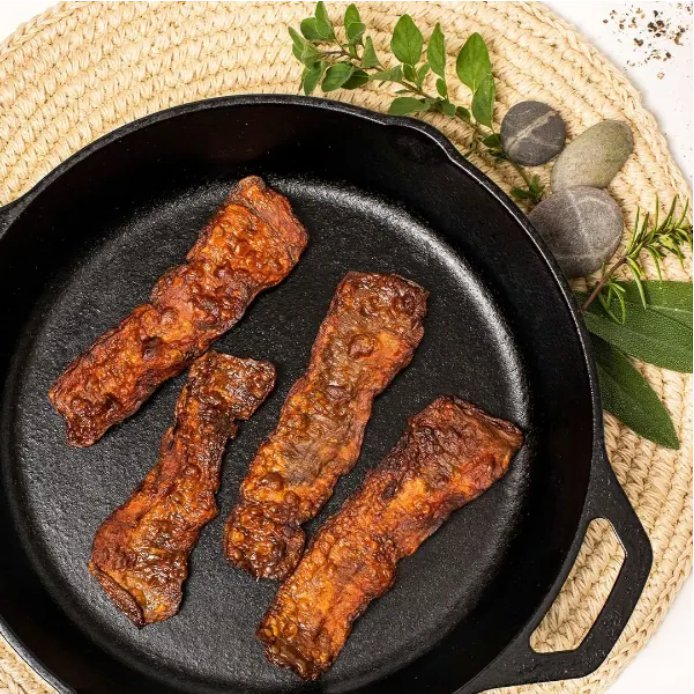
Finally, you don’t necessarily need to buy prepared mushroom or mycelium-based meat alternatives. There are certain culinary mushrooms that are naturally meaty in texture, taste, and size and can be used to create delicious steak or beef patty substitutes. These include portobello mushrooms, king oyster mushrooms, lion’s mane mushrooms, chicken of the woods, and lobster mushrooms. King oyster mushrooms have thick stems that, when cooked, offer a substantial, meat-like bite.
Since mushrooms are so absorbent, you can make these mushrooms take on just about any flavor profile by marinating them. They are ideal for grilling, and in the case of the large portobello mushroom, their caps are the right size and shape to substitute for a burger patty.
For a twist, try using finely chopped oyster mushrooms in a hearty chowder or to mimic pulled pork in sandwiches. Enoki mushrooms can also be a great addition to these dishes, providing a unique texture and flavor.
Now let’s dive into why mushroom meat substitutes are so ideal for your diet and why they are superior to plant-based meat substitutes available on the market.
If you’re eating plant-based to help save the environment, you can rest assured that mushrooms and mycelium are grown using environmentally friendly cultivation practices that not only protect your health, but the health of our environment.
Producing two pounds of oyster mushrooms emits only 2.99–3.18 kilos of CO2, which is ten times less than conventionally farmed meat.
Furthermore, cultivating mushrooms or mycelium requires little land usage and doesn’t accelerate the destruction of natural spaces. It’s estimated that just one acre of land can produce one million pounds of protein-rich mycelium-based meat annually [4] or over 335,000 pounds of white button mushrooms [8].
Lastly, the amount of water used in commercially growing oyster mushrooms is a tiny fraction of the water used to produce meat or the plant-based ingredients used in meat substitutes.
For example, the ingredients used to make 1 pound of soy burger (soybeans, soymilk powder, soya paste, corn, onion powder, smoked paprika, and carrots) require 452 gallons of water to produce [9]. Whereas, 1 pound of white button mushrooms requires only 1.8 gallons of water to produce [8].
The following chart illustrates just how little water is necessary to grow mushrooms relative to common vegetables, grains, nuts, and meat.
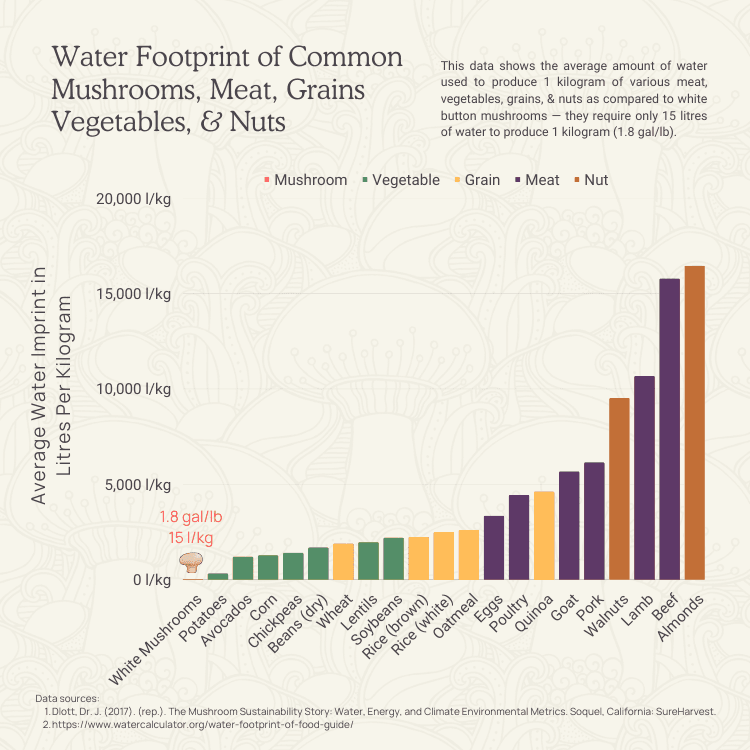
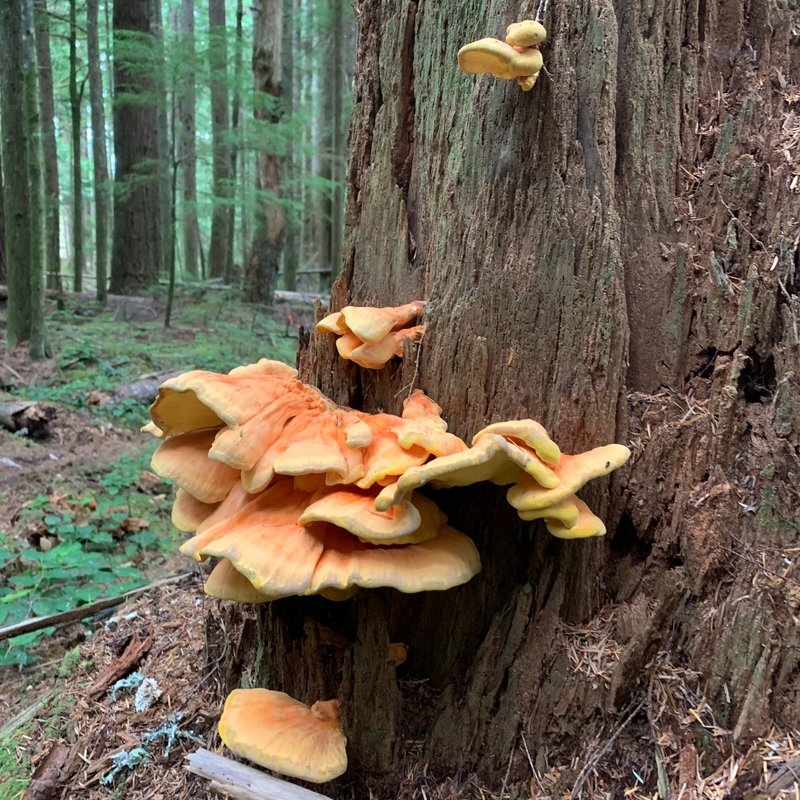
Another major benefit of mushroom meat substitutes is that they’re much tastier than plant-based meat substitutes.
Mushrooms taste better than plant-based meat substitutes because they contain glutamate, an amino acid naturally found in fungi, which gives them the savory, meaty flavor called umami.
This is why some species of mushrooms, like beefsteak fungus (Fistulina hepatica) and chicken of the woods (Laetiporus sulphureus), strikingly mimic the taste of beef or chicken. Species like lion’s mane mushroom have a subtle shellfish flavor that can also make them suitable as a seafood alternative.
Another pleasant culinary bonus: mushroom meat substitutes are crispy and chewy when cooked well. That’s because the thread-like structure of mycelium gives them a similar texture to meat, especially when prepared on medium-high heat. However, be mindful that boiled mushrooms may not achieve the same texture as other cooking methods. You can also add a touch of hot sauce to enhance the flavor profile of your mushroom dishes.
Still, it’s important to note that most mushroom species contain less protein than meat. As such, they can’t serve as a complete nutritional replacement. However, species such as L. edodes, A. bisporus, and A. aegerita contain more than 20 g of protein per 100 g of product [5].
Nonetheless, some companies have found a way to develop mycoproteins, or fungal proteins, and incorporate them in the mycelial fermentation process without altering their taste.
Therefore, you’ll be able to enjoy healthier and tastier mycelium-based burgers that are nearly as protein-rich as meat.
One of the many benefits you can get from consuming mycelium-based or mushroom meat substitutes is that they often have more health benefits than convenient plant-based meat substitutes.
Edible mushrooms are rich in nutrients, “namely sugars (carbohydrates), proteins, lipids, inorganic salts (minerals), vitamins, dietary fiber, and water,” as well as low in calories [5].
Carbohydrates are the most efficient form of energy for the human body, which means that mushrooms make a great energy source with about 60% of the dry weight coming from carbs, mainly polysaccharides [5].
Protein in mushrooms can be mostly attributed to ergothioneine, which is an amino acid that has potent antioxidant properties and may support the aging process. It possesses a remarkable array of health benefits that make it uniquely helpful to the human body.
This powerful antioxidant is highly efficient at neutralizing harmful free radicals, which are known to cause oxidative stress and damage cells. Ergothioneine's distinctive feature lies in its ability to be actively transported and concentrated within cells, particularly in areas prone to oxidative stress, such as the liver, bone marrow, and eyes.
This characteristic sets ergothioneine apart from other antioxidants, allowing it to provide targeted protection and may support vital organs and tissues. Furthermore, this compound has been demonstrated can help the body maintain a balanced inflammation response.
Ergothioneine's unique molecular structure and its specific uptake mechanism make it an exceptional ally in promoting overall well-being and supporting optimal cellular function in the human body.
Additionally, mushrooms contain several other natural antioxidants, including carotenoids and selenium.
These antioxidants break down reactive oxygen species (ROS)—harmful compounds with unstable oxygen molecules that can break down DNA and RNA, and cause cell death.
Carotenoids, in particular, are potent antioxidants because their molecular structure has a strong affinity for oxygen [6].
All that is to say, the long-term health and proper functioning of the cells in your body benefit from the unique antioxidants in mushrooms.
Plant-based “meats” are often made with allergens, such as wheat, soy, and peas [1]. Many people have allergies or sensitivities to these ingredients and need to avoid them.
Common plant-based meat alternatives include tofu and tempeh, made with soy, and seitan, made with vital wheat gluten. These products are common substitutes for chicken items but are also off-limits for many people with allergies.
Although mushroom allergies do exist, they are much less common in comparison to other food-based allergens like wheat and soy.

Some people report having some gastrointestinal issues after eating mushrooms. However, this can often be attributed to eating them raw or undercooked.
Mushrooms require high, constant heat to break down the unique fiber types in them. Without this processing, mushrooms can indeed be harder to digest. Bottom line: cook your mushrooms. If you're adventurous, try adding a dash of hot sauce to your mushroom dishes for an extra kick.
Given this nutritional information, it is easy to see how nutrient-dense mushrooms and mushroom meat substitutes can be in comparison to other plant-based meat substitutes.
But this is just the tip of the iceberg. When it comes to mushrooms, you don’t have to rely just on eating them to get their abundant health benefits: you can use functional mushroom supplements.
Now that you know the benefits of fresh mushrooms and commercially prepared mushroom meat substitutes, you may be interested in learning that you don’t actually have to eat mushrooms to get their abundant health benefits.
Mushrooms can be extracted into a powder form that can be taken as a daily supplement.
There are a few advantages to incorporating mushroom supplements into your diet:
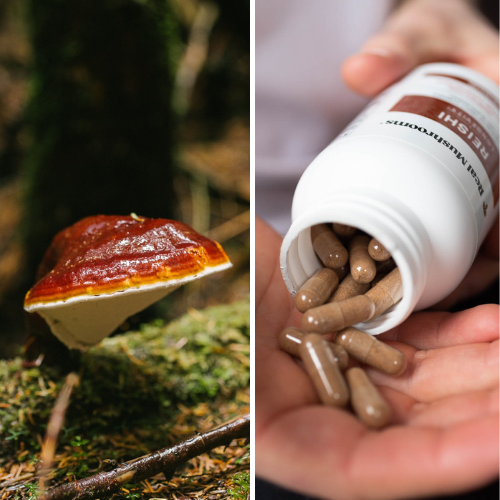
Not all mushrooms are edible in the yummy sense. In fact, some of the most useful mushrooms in the world for delivering unique health benefits are tough, leathery, or dense, like wood.
For example, turkey tail mushrooms (Trametes versicolor, Coriolus versicolor, or Polyporus versicolor) contain an impressive range of well-known functional components, including polysaccharopeptide (PSP) and polysaccharide-K (PSK).
These immunosupportive agents may help restore the balance of the immune system without any particular target. They may support your immune response to be adaptive and resilient.
Reishi mushroom is another example. It has been extensively used in Traditional Chinese Medicine for hundreds of years, and now we have scientific studies showing why and how it supports health and longevity.
However, turkey tail and reishi are not mushrooms you would snack on. They need to be extracted and made into an extract powder or turned into tea. That’s one of the great advantages of having mushroom supplements at your disposal. You can easily tap into the adaptive and multi-faceted benefits of functional mushrooms that are harder to source or tough to eat.
Sadly, as the popularity of the health benefits of mushrooms has grown, so have unscrupulous traders.
It will surprise you to know that most mushroom supplements on the market are made using mycelium, which is grown on grains like rice, oats, and sorghum. As a result, the myceliated grain becomes part of the final product, diluting the beneficial compounds.
The table below showcases the difference between two Cordyceps militaris products, one from Real Mushrooms and the other grown from myceliated grains:
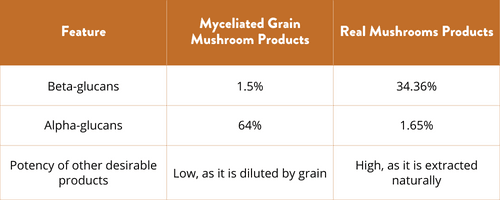
At Real Mushrooms, we’re committed to making functional mushroom products sourced from real, high-quality mushrooms (fruiting body).
Since our products aren’t made from myceliated grains, they contain a wide range of potent and beneficial health-promoting compounds and serve several functions. These functions include:
Try our line of 100% Real Mushroom products that deliver all the health benefits of a real fucntional mushroom today.
Mushroom meat substitutes are more than the latest dietary fad—they’re the future. It’s not hard to understand why.
When it comes to mushrooms, you can eat them for their culinary, ecological, and health benefits. You can also tap into the adaptive powder of mushrooms for their versatile use as daily health support by taking a mushroom supplement.
Enjoy the unique benefits of the world of fungi and get into the mushroom groove!

Disclaimer: The information or products mentioned in this article are provided as information resources only, and are not to be used or relied on to diagnose, treat, cure, or prevent any disease. This information does not create any patient-doctor relationship, and should not be used as a substitute for professional diagnosis and treatment. The information is intended for health care professionals only. The statements made in this article have not been evaluated by the Food and Drug Administration. Any products mentioned are not intended to diagnose, treat, cure, or prevent any disease. The information in this article is intended for educational purposes. The information is not intended to replace medical advice offered by licensed medical physicians. Please consult your doctor or health practitioner for any medical advice.